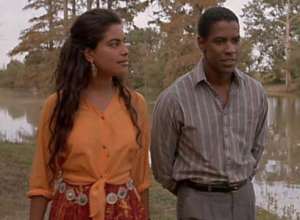I got home from work last night and was telling my mom, with bated breath, “Oh my god! Quantico premieres on Sunday and earlier this week, a friend and I were driving up I-75 and we saw a big billboard with Priyanka’s face teasing Quantico.”

I was actually breathless — the last time I was this giddy was when I proudly announced I was going to see the Spice Girls Reunion Tour eight years ago.
This is what the prospect of a weekly visit from Priyanka Chopra by way of ABC’s new Grey’s Anatomy-meets-Homeland-with-a-splash-of-Scandal does to me: It transforms me into a fanboy.
My mom was watching Wheel of Fortune. She turned to me to say, “She was on Good Morning America actually.” Then she smirked a little. “She’s overdoing the accent a little and trying to sound American…but you can tell it’s not quite there yet.”
“Her accent hasn’t always been like that?” I asked.
“No. She’s definitely playing it up for American audiences. You can tell in the way she pronounces the word ‘Quantico’.”
“Well, I did hear she has accent coaches. I don’t care. I’m going to watch it! Are you going to watch it?”
She laughed. Of course she’s going to watch it.
A little while later, my grandmother emerged from her room to brew her morning chai. I was telling her, “Did you know Priyanka Chopra’s new show starts Sunday night?”
Her eyes lit up. “Oh! I have to watch it.” This, from a woman who long ago gave up Lifetime to watch the soaps, reality television, and old Bollywood films broadcast on Zee TV and Star Plus. When I told her about the drive up the highway where I saw Chopra’s face on a billboard, she beamed even more. “I love that an Indian is making it big in America,” she said jubilantly.
The verdict’s out on what my dad thinks, but he was one of the first to recommend to me her 2013 film Barfi, where she turns in an Oscar-worthy performance as a 19-year-old autistic woman. (When I told him I cried at the end, he confessed that he did too.) He may be thrilled for Chopra’s new reach without being thrilled about Quantico itself.
~

Of course Chopra isn’t the first Indian star to headline her own television show in the United States — that goes to Mindy Kaling whose The Mindy Project we can credit, in ways, for paving the way for a show like Quantico to even exist. Kaling has always been careful not to box Mindy Lahiri into a role that was defined by her ethnicity. This has parallels with the asks Chopra made of her character Alex Parrish on Quantico. Chopra tells DNAIndia, “I had clearly told them that if you want to treat me like an actress and not a ‘Bollywood’ jewel, where I am supposed to dance and do those things, then I am fine. Which is why the parts they chose for me and scripts I read were for characters that are ethnically ambiguous.”
Of course in wanting to connecting with audiences in a world where our ability to watch television has become a global experience transcending cultural boundaries, it makes sense that a global star like Chopra would make such an ask. As Alex Parrish, she’s not confined or saddled by the stereotypes that tend to dog desi women in American popular culture. We can breathe easy knowing there won’t be mentions to arranged marriage, spicy food, or even the Bollywood film industry from where Chopra herself hails.
Yet, Chopra’s Bollywood star power is why Quantico has found itself in a unique position: Ahead of the series premiere, the international broadcast rights to the series has already been sold to many markets globally, like the United Arab Emirates, made possible by Chopra’s Bollywood reputation.
This isn’t a surprise, really. Bollywood films tend to impact audiences in the Middle East, Africa, and Southeast Asia in accessible ways that many Hollywood films cannot.
Chopra’s star power is also why you can count on audiences like my grandmother and her sister in Delhi to both tune in. It is the kind of reach that Kaling doesn’t enjoy — nor should it, as her work is engineered to fulfill a different creative vision and attract a different audience.
~
We talk a lot about representation and diversity these days. Chopra’s appointment to the head of the Quantico cast comes courtesy of a serendipitous chat Chopra’s manager Anjula Acharia-Bath had with ABC’s Head of Casting and Talent Keli Lee. Lee is the same mastermind responsible for making Sandra Oh happen on Grey’s Anatomy and Kerry Washington on Scandal.
“Apparently,” I told my mom, “Priyanka only agreed to take on Quantico if she could continue acting in Indian films as well.” There is power in this — that Indian film stars aren’t hungry for American attention, that they value the industry they’ve made for themselves. There is power in how Chopra was able to make this ask to one of the biggest television purveyors in the world. An American audience, she decided, would be nice, but isn’t necessary.

But representation, diversity, seeing someone from a culture similar to my own on my television screen — and experiencing this with my family, having this be our morning chai conversations, this is an important milestone for us. In the 1990s, we settled for scraps. We witnessed Sarita Choudhury kill it in Mississippi Masala only to wonder where the wealth of offers for her went after. We celebrated Parminder Nagra in Bend It Like Beckham — but were stumped when the film offers went to her notably blander co-star Keira Knightley. When Bollywood star Aishwarya Rai attempted a U.S. breakthrough, we pulled for her, despite questionable roles in Bride & Prejudice and The Pink Panther 2. Freida Pinto and Dev Patel from Slumdog Millionaire were revelations and steps in the right direction, but with Danny Boyle shaping that film, it didn’t feel like the victory was completely ours…not yet. Archie Panjabi had a good run on The Good Wife — only to be sidelined and ousted and as a people, we’re still recovering from that one. It felt personal.
In our consumption of American pop culture, we are frequently asked to be content nibbling on scraps — and Chopra, in the most diplomatic way possible, has indicated that if she comes to the U.S., she won’t settle for scraps herself. No bit roles, no cameos, no typecasting. Chopra knows her value and she isn’t backing down — and it is a watershed moment for desis in the U.S. to be witnessing one of their own so confidently asserting what they want out of our entertainment industry.
For this reason, it’s easy to root for her. We want her to succeed. We’re rooting for her because when she wins, we win. For Chopra to succeed means that the rest of us don’t need to fill the model minority myth to excel in America. For Chopra to succeed means that our parents can encourage the next generation of Priyanka Chopras to chase their dreams.
“Priyanka Chopra’s name is in all the newspapers — everyone’s so excited!” my grandmother told me shortly after getting off the phone with her sister in Delhi.
Chopra’s stint on U.S. television bridges the cultures of Indians born in the U.S. with those of their parents, their parents’ parents, and the families they left behind in India.
The whole world is watching…but more importantly, we’re watching together.
Rohin Guha is an editor at The Aerogram. Follow him on Twitter @ohrohin. Follow The Aerogram on Twitter @theaerogram.













Congrats Priyanka and good luck for your American TV series.